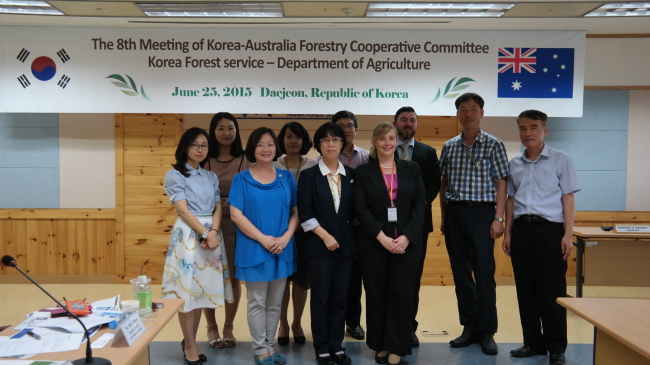The Korea Forest Service has established an in-house division to deal with forestry trade in an effort to cope with the fast-changing market and take advantage of the Korea-China free trade agreement.
“We plan to promote export of forest products, and will foster them as our new growth engine to properly respond to strengthened global nontariff barriers,” said Kim Yong-kwan, director general of International Affairs Bureau at KFS in an interview to The Korea Herald.
The bureau head introduced three major policies promoted by the KFS to boost exports of forest products.
First, the agency plans to establish an export infrastructure fit for the post-FTA environment by developing regions specialized for exports in order to continue supplying quality products. There are also plans to find appropriate marketing channels and invite prominent buyers for forest products.
Lastly, Kim said the organization plans to create better conditions for expanded exports, such as boosting safety of forest products through manufacturing management and overseas certification.
 |
| KFS director general Kim Yong-kwan speaks to The Korea Herald. KFS |
The team’s plans of exporting forest products come ahead of the effectuation of the Korea-China FTA slated for early next year. Kim said the trade team plans to emphasize quality to counter competition from Chinese forest products.
“China is the world’s largest forest products manufacturer and buyer. It is a fact that it is difficult to export forest products to China, but we plan to create a market by targeting wealthy Chinese consumers, emphasizing the cleanliness and safety of Korean forest products,” he said.
For this, the agency is currently looking for ways to market forest products with comparative advantage in quality, such as shiitake mushrooms grown from oak trees, chestnut, bonsai trees and specialized wood products.
“It is especially crucial to collaborate with the Agriculture Ministry to target the Chinese market,” he said, adding that the KFS, in cooperation with the ministry, will also push for exporting products to major food distribution channels in China and share Qingdao’s agricultural food distribution base.
In addition to the Chinese market, the KFS is also seeking to export products to the halal market in the Middle East and Southeast Asia.
“The biggest key point in entering the halal market is that there needs to be a cross-certification of halal product by both the Korea Muslim Federation and the halal certification organizations of different countries,” he said.
“We currently have cross-certification with Malaysia, and we are working with related organizations to finish the process with Indonesia, Singapore, and the United Arab Emirates by this year.”
 |
| Korean and Australian officials pose during a meeting to discuss cooperation in forestry in Daejeon in June. KFS |
In addition to acquiring certification from the KMF, the agency is also focusing on raising awareness on its products overseas, running a promotion in Indonesia and Thailand in the spring, and plans to promote in Dubai in November through the K-Food Fair.
The KFS added that other than promoting forest products, they have also worked on various ways to ensure that wood lumbered illegally overseas will not be imported to Korea.
“There are international movements to ban the distribution of illegally harvested wood products,” Kim said. “In June this year we held a cooperative committee with Australia to prevent such imports.”
Additionally, with the assistance of the KFS, 30 companies have invested in 13 countries since 1993 in forests roughly six times the size of Seoul, with plans to expand up to 1 million hectares by 2050.
The agency said it plans to start various projects to further pursue overseas forestry businesses in the future.
By Sang Youn-joo and Lee Kwon-hyung (sangyj@heraldcorp.com)(kwonhl@heraldcorp.com)



